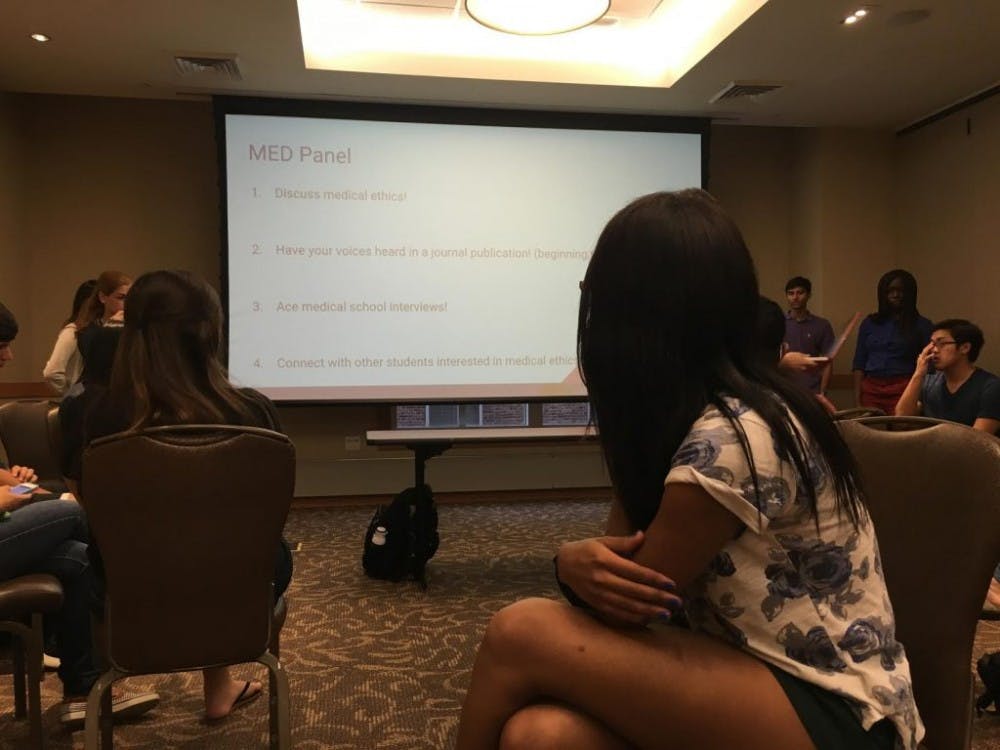The Johns Hopkins Medical Ethics Discussion Panel (MedPanel) held its first discussion meeting of the year on Tuesday, Sept. 20 in Charles Commons. The topic of the discussion was Ethics in Crisis Situations, which focused on how medical personnel prioritize care in times of extreme duress and limited resources.
The meeting opened with a presentation highlighting the objectives of MedPanel discussions such as debating medical ethics, preparation for medical school interviews and connecting with other students interested in medical ethics.
MedPanel president Donghyun Kim noted that an online journal will launch this semester featuring student voices on topics discussed in their meetings.
The panel then introduced two conflicting principles in medical ethics: Utilitarian Medicine, which advocates for the greatest number of lives saved, and Deontological Medicine, which emphasizes the individual patient.
The discussion began with relatively broad questions, prompting students to consider any ethical issue that could arise during a medical crisis. Audience responses were slow at first, but panel members facilitated the conversation by asking additional questions and offering possible answers.
The panel discussed the real-life example of the loss of power and running water at Memorial Hospital in New Orleans due to Hurricane Katrina. There, doctors prioritized patient care as best they could, but as the situation worsened they ultimately made the decision to inject critically ill patients with morphine to “hasten their deaths.”
Participants were also asked to consider a scenario in which a hospital could only save a limited number of patients, including older, terminally ill patients and babies with genetic disorders not expected to reach adulthood.
The physician in this hypothetical scenario was a family member of one of the affected children.
Students were conflicted over the most ethical course of action. Freshman Prakul Suresh acknowledged that thoughts during the panel discussion may differ from the potential actions taken in the situation.
“I realized that there are huge discrepancies between what I may say right now is the ethical thing to do and what I might actually do in the situation,” Suresh said.
Although these situations forced students to make difficult decisions, the panel made the argument that considering these sorts of cases are essential, especially for students going into medical fields.
“In medicine you don’t think about these things, but especially if you want to be a doctor you have to be ready to face these ethical issues,” sophomore panel member Ansh Bhammar said. “At a young age you think, ‘Oh, I just want to become a doctor,’ but when you join things like MedPanel you actually think critically about the career you’re going to have and the problems you’re going to face.”
Participants related to Bhammar’s insight on the ethical challenges doctors face. Freshman Sean Bunachita learned how tough it can be to prioritize in healthcare.
“I learned that it’s actually really tough deciding what you should prioritize during a crisis situation because some people have difficult ethical standards than others and trying to confine that into one central policy is really tough,” Bunachita said.
Despite the difficulty of the choices they were faced with, students enjoyed the fast-paced, mentally demanding aspect of the discussion.
Students found the fast pace of the discussion engaging and different from university classes on ethics.
“It was pretty cool to be kind of put on the spot and have to think things out; It’s not something we did in Bioethics, where we have weeks to write papers,” senior panel member Diana Lee said.
Senior Rob Besch agreed with this sentiment and added that MedPanel allowed for greater discussion.
“Intro to Bioethics is a really good course,” Besch said. “But it’s a course, and your TAs are overworked and underpaid, and here you get to talk in a group setting about what you guys believe and ask yourself really critically why, helping you understand your own opinions.”
Senior panel member Ketty Liang noted that the event not only helped her explore ethical dilemmas in medicine but develop speaking skills.
“One of the major benefits of this group is not only does it promote group discussion, but it also promotes public speaking and it really prepares an individual for not only a medical school interview, but [also for] the ability to discuss any controversial issue and support it with facts and support it with their own ideas rather than just kind of give some sort of generic, cardboard answer,” Liang said.
Panel member Amy Clarke found that the discussion was not just for pre-meds but was relevant to other students as well.
“It’s not just supposed to target pre-med students,” Clarke said. “It’s supposed to target students from all over the University, which I think is really important because sometimes you sort of have a divide between pre-med and non-pre-med students, and this club is a way to bring them all together to discuss something they’re interested in.”
Liang reiterated this sentiment and expressed hope that all students will find interest in the discussions.
“MedPanel is a small, discussion-based room, but at the same time we want to extend that so that the entire Hopkins campus, pre-med or not, can get involved in the discussion, because ethics affects everybody.”





